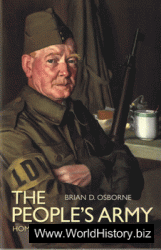For the next seven years the PLO and other Arab organizations continued their guerrilla warfare against Israel, resulting in increasingly violent retaliation by the Israelis. Both sides committed many atrocities against the civilian populations of the other side. Finally, in 1973 the war (which had never really ended) broke out anew. On Yom Kippur, the Jewish day of atonement, Egypt, Syria, Iraq, and Jordan attacked the Israeli military and destroyed most of its tanks and aircraft.

In 1978, U. S. president Jimmy Carter (center) helped Israeli prime minister Mena-chem Begin (left) and Egyptian president Anwar Sadat (right) find a peace agreement in the historic Camp David Accords. (National Archives)
President Richard Nixon and his secretary of state, Henry Kissinger, took equipment from the U. S. armed forces around the world and resupplied the Israeli armed forces, which allowed the Israelis to fend off the Arab attacks. Angered by U. S. actions, the Arab states declared an oil embargo against the United States, which had come to be dependent on Arab oil.
The embargo resulted in long lines at filling stations throughout the United States and engendered widespread resentment against Israel. Nevertheless, the seemingly unqualified U. S. support for Israel continued, as did the guerrilla war waged by the Arab states and Israeli retaliation in the form of the bombing of Arab cities and refugee camps.
During the administration of U. S. president Jimmy Carter from 1976 to 1980, U. S. diplomats arranged peace talks between the Israelis and the Egyptians. The U. S. Department of State hoped these talks would lead to a general peace settlement in the Middle East. The focus of the discussions centered around the concept of "peace for land." The Israelis would return the territory they occupied during the Six-Day War in return for Egyptian recognition of the legitimacy of the Jewish state and a peace treaty between the two nations.
At the presidential retreat of Camp David, the leaders of Egypt and Israel concluded an agreement, with promises of massive U. S. aid for economic development in both countries. The peoples of the world hoped that a lasting peace settlement in the Middle East was at hand.




 World History
World History









